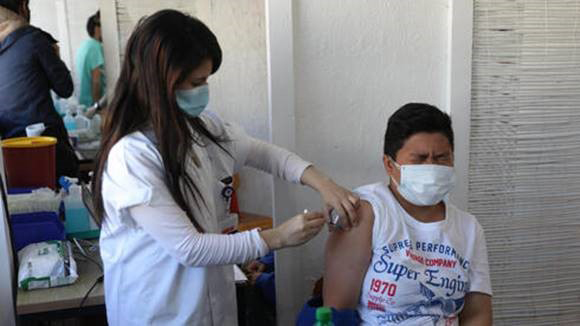click to dowload our latest edition
CLICK HERE TO SUBSCRIBE TO OUR NEWSLETTER


Published
3 years agoon
Although South Africa is only starting to vaccinate its healthcare workers, Israel has already vaccinated nearly half the population.
It’s not only Israel’s citizens who have been vaccinated, but also migrant workers living there from the Philippines, Moldova, and Nigeria, as well as Sudanese and Eritrean asylum seekers. They are receiving the Pfizer-BioNTech coronavirus vaccine at the Tel Aviv COVID-19 Vaccination Centre in the southern part of the city, home to a large migrant community.
As part of an initiative to inoculate the city’s foreign nationals, Tel Aviv City Hall and the Sourasky Medical Center started administering vaccines free of charge to the city’s foreign nationals, many of whom are undocumented asylum seekers.
This was evident on Tuesday, 9 February, the first day of the operation, as dozens of asylum seekers and foreign workers in Tel Aviv lined up outside the building to receive their first dose of the COVID-19 vaccine. Posters provided information in English, Tigrinya, Russian, and Arabic.
“I’m very happy,” Indian national Garipelly Srinivas Goud told Associated Press. Lamenting that foreign workers in Israel don’t have money or insurance to afford to pay for the vaccine, Goud, who has been working in Israel for eight years, welcomed the vaccine drive as a “very good decision”.
Although it’s the government’s responsibility to vaccinate everybody within the nation’s borders, Eytan Schwartz, spokesperson for Tel Aviv municipality, said the city would take the next step and start “to vaccinate illegal or undocumented asylum seekers as well”.
And although far from completing the vaccinating of its own population, having thus far delivered more than 4.4 million first doses of the Pfizer vaccine and at least three million second doses, Israel has started providing the Palestinian Authority (PA) with thousands of vaccines for its healthcare workers. This is in spite of the fact that the ultimate responsibility for health services and vaccine acquisition falls upon the PA, elected by Palestinians to govern the West Bank.
After receiving thousands of doses from Israel, the Palestinian Health Ministry administered its first known coronavirus vaccinations at the beginning of February. It announced the start of the campaign by saying that Health Minister Mai al-Kaila had received a first dose along with several frontline medical workers. While acknowledging receipt of 2 000 doses on Monday, 8 February, the first batch of vaccines sent by Israel, the PA didn’t say where they came from.
Back in May 2020, COVID-19 relief aid from the United Arab Emirates was rejected by the Palestinian leadership because it arrived by freight plane to Israel’s international airport without prior co-ordination with the PA. This resulted in 14 tons of urgently needed COVID-19-relief medical supplies languishing at Ben Gurion Airport. The reason for the PA refusing to accept delivery was because it didn’t want to be seen as condoning the normalising of ties between Israel and the Arab world.
Disregarding the health of his people, Osama al-Najjar, the medical services director of the PA health ministry, explained that Ramallah couldn’t “accept shipments that are a gateway to normalisation between Arab countries and Israel”.
Asked what he thought would happen to the medical supplies, al-Najjar responded, “I don’t know where they will go, but we won’t accept them. They’re free to do with them what they please, but we will neither accept them nor welcome them.”
However, Al-Najjar did acknowledge that the PA was “in need of ventilators”.
What we are “all in need of” is better understanding and co-operation as there are no borders when it comes to the health of the planet and its vulnerable citizens. Israeli epidemiologists agree that it’s in Israel’s interest to ensure Palestinians are vaccinated as quickly as possible, as the populations are too intertwined to have one gain herd immunity without the other.
As recently departed Health Ministry Director-General Moshe Bar Siman-Tov told The Times of Israel in January, “The message is very simple: we are one epidemiological unit. As much as we can, we have to help them address this matter.”
